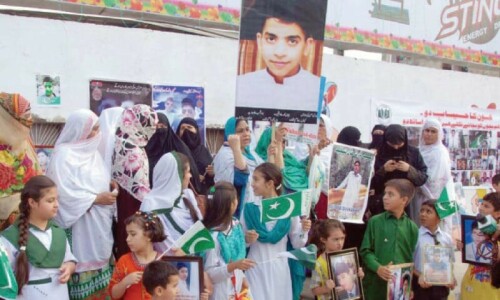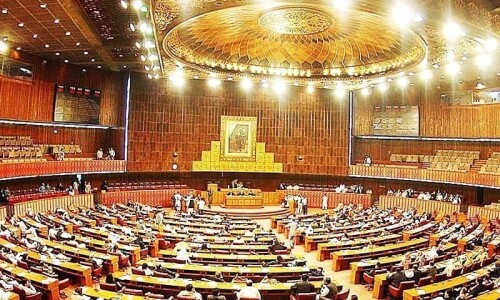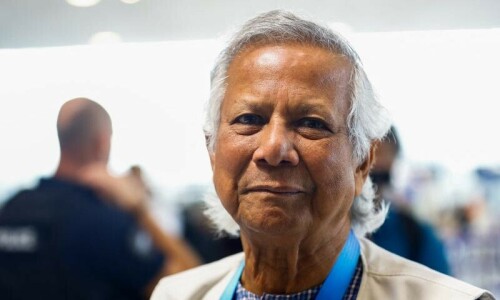
“I want to be a doctor. That is my ultimate dream and God willing I will be one day,” says Zainab (name changed), a resident of Lahore’s red light area, Heera Mandi.
The daughter of a former sex worker, 17-year-old Zainab has high hopes and wants to carve a better life for herself. Her middle-aged mother left the sex trade many years ago, but could not move out of this area as the “society does not accept them because of our past”.
Zainab and her mother are not the only ones who want to move out of the seedy surroundings and turn around their lives.
Maham (name changed), is 25-year-old commercial sex worker in Heera Mandi, also known as Shahi Mohalla. Sitting on a charpoy in her small, dirty room, which serves both as her and her two children’s living quarters and her workplace, she shares how she and her three sisters are the fourth generation of prostitutes in her family. Her three year old daughter Shaani tugs at her clothes as Maham talks. “But I do not want Shaani to go through this despicable life. I am struggling to get her an education,” she says with a glimmer of hope in her eyes.
That little ray of hope, or a window of opportunity, is provided by SHEED, an NGO working in the area. As one walks towards the back alley of Cuckoo’s Den, the dingy lanes are dirty, with stray dogs all around. Running around in these lanes are children…..lots of children. Every age, every size.
They giggle in return when you smile at them. Sparkling eyes, with dreams of the future as yet uncorrupted by reality, clad in raggedy clothes…. these are the children of the sex workers of this area.
In between these lanes is the tiny school that SHEED runs in this area for the past 5 years. The first thing one notices is that besides the hand-painted pictures of butterflies and flowers on the front wall of the school, with chipping paint, are written these two phrases: “Mein acha hoon, Mein achi hoon (I am good, I am good)”.
Aliya Rafeeq, one of the teachers in this school, says, “This is to reiterate to these children that they are not bad, because the world tells them otherwise. They are an ostracised part of the society, and grow up with the whole world reminding them every day that they are no good.”
The “Apni Taleem” Project of SHEED promises a chance at non-formal education for children of sex workers, in rotation, to the children of Shahi Mohalla. “We give a one year crash course in literacy and awareness to some 60 to 80 children each year. We use the Jugnoo Sabaq literacy program in the curriculum,” says Aliya.
Jugnoo is an adult literacy program aimed at those that have had no contact with basic reading/writing in the past. After completing the program participation, the student is able to read a newspaper comfortably, write basic letters and requests, in addition to performing basic mathematical calculations that will eventually empower him/her to earn a better livelihood.

In this one year at the SHEED School, not all children are able to complete Jugnoo, but by then have learnt enough to get them admitted into any of the nearby public schools which are finally willing to admit these children.
“For this, SHEED had to undergo years of hard work of giving the schools sensitisation through one-on-one talks and literature. This work continues every day, as many schools are not ready to admit these children simply because many of them do not know the names of their fathers, and in many cases the fathers are known but refuse to give the child their name,” says Lubna Tayyab, the mastermind behind SHEED.
Tayyab, a motivating woman, is working at a grass root level in this community-based program aimed at the welfare of the dancing girls and sex workers of the area.
“I was myself born and bred in this area. As a child, I faced discrimination at school simply because I was a resident of this locality. So I knew very early on in life that I wanted to do something to help alleviate the problems of the people of Heera Mandi,” shares Tayyab.
Heera Mandi is home to an approximate 1500 female sex workers who live in abject conditions of poverty, contrary to the popular belief that these women earn a lot. Some 1700 to 2000 children of sex workers are members of this community. In addition, around 500 run-away children have also gravitated towards this ghetto. A lot of children in the area, needless to say, become sex workers at an age as early as 10 years or less. That, combined with sexual and physical trauma and acquiring of STDs poses serious risk to the mental and physical wellbeing of the children of this area.
Structural interventions like changes in laws, policies and economic empowerment projects that make the residents and in particular the children a less vulnerable group are important. In this regard, education and awareness plays an important role. An example could be the pilot projects of SHEED in which they trained smaller groups of willing street children for vocations and skills like training them to become waiters at eateries, so that they have a chance at giving up sex trade.
It is ironic to note that earlier this year, in June 2011, Pakistan has become the 144th country to ratify the Optional Protocol to the United Nation's Convention on the Rights of the Child on the sale of children, child prostitution and child pornography, yet no programme is there for the rehabilitation of the children of Shahi Mohalla. It must be noted that Pakistan was one of the early leaders in the international community’s commitment to defend the rights of children, ratifying the Convention on the Rights of the Child (CRC) as early as 1990.
“As per the mandate, Unicef assists the governments to ensure that all children are protected from abuse, exploitation and other types of violence,” says Smaranda Popa, Chief, Child Protection Section, Unicef Pakistan.
But Popa does feel that “For a system to be functional there is need to have a legislation which is compliant with the CRC, a public administration which is responsive to the needs of the citizens, to have policies, resources, capacity and capability to care and protect the children and families in need of protection. The results of the support extended by Unicef and partners to the federal and provincial governments are promising.”
Shaani and other children of this area need what Popa sees as an ultimate aim with regards to the children of sex workers of Heera Mandi, and all the children of Pakistan: “To be healthy, to be educated, to be protected, to live in a protective environment, to develop at their full potentiality.”
It is this aim that provides hope, and for the residents of Heera Mandi, hope is the greatest elixir. And hope is what the children of Heera Mandi need, in order to accomplish their dreams and control their destinies.
The writer is a freelance journalist, blogger and columnist, who writes on human rights, reproductive health and gender issues.
Images courtesy of Farahnaz Z. Moazzam and SHEED.
[nggallery id=3613]













































